Search Results for Tag: video
Different approaches to web video vox pops
The vox pop is one of those classic devices in a journalist’s storytelling toolbox. It’s a snapshot of public opinion about a given topic, and more often than not, a controversial one.
But when you take the vox pop online and use it within a multimedia story, or produce web video content, there’s the opportunity to be creative and offer more than just producing a simple series of talking head shots.
![]() read more
read more
Drones as journalism tools
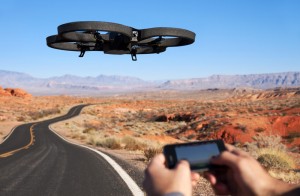 Unmanned aerial vehicles, better known as drones, have made their way out of military laboratories and into local electronics shops during the past ten years. Today, anybody can buy their own drone for as little as 300 euros. And the unmanned craft can even be used by journalists, for example, to cover protests or catastrophes.
Unmanned aerial vehicles, better known as drones, have made their way out of military laboratories and into local electronics shops during the past ten years. Today, anybody can buy their own drone for as little as 300 euros. And the unmanned craft can even be used by journalists, for example, to cover protests or catastrophes.
Marcus Bösch talks about the pros and cons of drone journalism.
![]() read more
read more
Equipment: Video Journalist
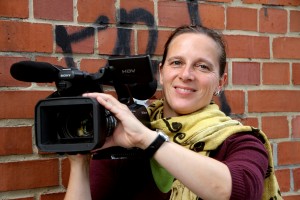 Gerlind Vollmer has been working as a freelance VJ reporter for Deutsche Welle since 2006. She has been working as a project manager and trainer for the Africa team at Deutsche Welle’s training center DW Akademie in Berlin since 2009. She takes us behind the scenes and shows which equipment she uses in the field to produce her VJ reports.
Gerlind Vollmer has been working as a freelance VJ reporter for Deutsche Welle since 2006. She has been working as a project manager and trainer for the Africa team at Deutsche Welle’s training center DW Akademie in Berlin since 2009. She takes us behind the scenes and shows which equipment she uses in the field to produce her VJ reports.
“It is important that a VJ journalist remains mobile and flexible. That’s why I’m no fan of dragging a heavy tripod along and often leave it at home. I can always find a chair, a table or a wall which can serve as a perfect tripod. On the spot, I’m mostly concerned with everything being at hand the very minute I need it, that’s why I always put on trousers with a lot of roomy pockets. Also, a VJ should never forget to put the headphones on while shooting – never ever!”

Foto:Steffen Leidel
Getting everyone up to speed in a converged Himalayan newsroom
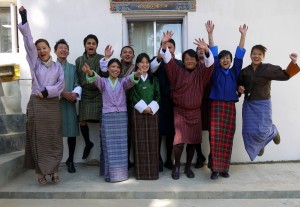 Even high in the Himalayas, reporters these days are being asked to do more.
Even high in the Himalayas, reporters these days are being asked to do more.
As part of a modernization drive, Bhutan Broadcasting Service (BBS) has combined their radio and television newsrooms. In the future, reporters will be required to provide news reports in both media. It’s hoped that the convergence will allow the state-funded station to cut costs and do more with limited resources.
It was against this background that two DW-AKADEMIE trainers went to Bhutan’s high-altitude capital Thimphu to conduct a workshop with an enthusiastic group of 12 young BBS journalists. While several already had some radio production experience, many had previously only worked on the TV side of things.
Together, the group started with a review of the basics, such as news judgment and news writing for radio, before moving on to the interview and how to ask that all-important first question that will grab your listeners and keep them from turning the dial.
![]() read more
read more
Lessons learned from multimedia workshops
 Every multimedia workshop differs from the next, but the lessons learned by the participants are always very similar. One thing is certain: You need patience and perseverance.
Every multimedia workshop differs from the next, but the lessons learned by the participants are always very similar. One thing is certain: You need patience and perseverance.
It also helps to stay calm and collected when learning to use the tools and technologies. It’s much like long-distance running. You start out full of confidence and high expectations, then lactic acid builds up in your muscles. Suddenly you feel like you’re reaching a dead end, frustration and exhaustion make you want to throw in the towel. Rage rises up, causing you to ask yourself why you even bother. But in the end, when you’ve achieved your goal and you click that “publish” button, you feel a rush of satisfaction.
Like any kind of creative activity, working with multimedia can stir up emotions and fray your nerves. But it doesn’t have to be stressful. Follow these tips to stay nicely on top of your multimedia work without losing your head.
Don’t overdo it!
The Internet has unlimited possibilities. The temptation is huge to exhaust all those possibilities. That’s not always to the benefit of the user. And the user is the main point to keep in mind.
Multimedia projects are often overloaded, bursting at the seams with (sometimes sub-optimal) video, audio and photographic footage. Driven by their excitement about the technical potential, authors can easily lose sight of the actual story they’re trying to convey. Just think of the endless audio-video slideshows with thinly told stories and so-so orchestration, the masses of blurry photos and unsteady video clips.
Bear in mind your own capabilities and keep an eye on your time management.
![]() read more
read more
Latest African Stories workshop in Ghana
Check out the latest videos from African Stories in Accra:
It’s a dirty but lucrative business. Solomon Tetteh works in the waste processing sector in Accra. He holds a university degree, but Solomon was not able to find a job. At first, his friends were not really supportive when he dreamed about building up his own business. Now, a year later, he is not only self-employed, he has also managed to create jobs for several garbage men, giving them the opportunity to support their families. Solomon also promotes environmental awareness in Ghana by distributing free garbage cans in schools. He wants young people to learn early how to separate garbage, and leave the land clean.
Social inequality, a sense of hopelessness in the face of poverty as well as crime drives more and more young people in Africa to use illegal drugs. Richard Armah was one of them. After years of drug abuse, he found the strength to free himself from addiction. Now, as a social worker, he is committed to help addicts from the poorest areas of Accra to say “no” to drugs. He’s been successful, even though his financial means are insignificant. Richard’s approach is preventive: educate people, so they don’t succumb to the temptation of drugs in the first place.
Asidu Abudu is an inspired inventor. A man who wants to make change for the better. Asidu wants to make life easier for his countrymen by creating small and effective devices for everyday use. He believes he has a competitive advantage over foreign inventors because he is more familiar with the needs of the country and its people. His main obstacle is funding. It is difficult to get, and there is not much of it. But this doesn’t stop him from pursuing his dream of going into mass production. In the meantime, he has managed to find some investors, and more and more young people who want to learn from him.
Cassava could help defeat hunger in Africa. Dr. Tay Nanam Dziedzoave is convinced that a great variety of products can be developed from a new high-quality type of cassava. Dr. Dziedzoave joined forces with several local NGOs to convince farmers to grow this new variety. He also helps them to sell the product and increase their income. And Dr. Dziedzoave is also working hard to convince the Government of Ghana that his ideas are worthwhile.
Painting a different picture of Africa
Being part of the African Stories workshop in Cape Town, I was most excited about meeting fellow young journalists from all over Southern Africa. The first thing I noticed was that we have a lot in common. They, as journalists, want their voices to be heard and they are eager to tell their own stories. But even more so, they want to show the world who they are as Africans – and not leave that to media outlets outside of Africa, which in their view, often present a one-sided image of the continent.
“Western journalists often only concentrate on one area like poverty,” said Mathews Nthala, editor at MUVI TV in Zambia. “In this workshop, we are given the opportunity to show that there is a lot of potential in Africa. Many people are doing well in terms of entrepreneurship and self-empowerment. An African led empowerment, that to me sums up what African Stories is about.”
![]() read more
read more
5 pocket video camcorder tips
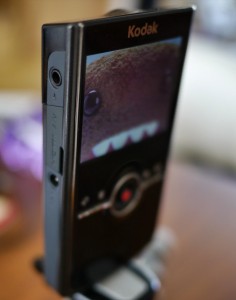 They’re small, relatively inexpensive and shoot high quality video. Pocket camcorders or “Flip” style video camcorders are a very useful tool for journalists, especially for producing video for the web.
They’re small, relatively inexpensive and shoot high quality video. Pocket camcorders or “Flip” style video camcorders are a very useful tool for journalists, especially for producing video for the web.
Just about all of the major camera manufacturers produce pocket video camcorders. And, it must be said that the HD video produced by many small point and shoot cameras and also smartphones now compete with these little wonders.
At present, the Kodak Zi8 is one of the main models the DW-Akademie uses during online journalism and web video courses. Flip is of course another well known brand, but these cameras are to be discontinued.
Whatever you use, it’s about the story and not the camera. But here are some of our tips for getting more out your camcorder and producing better quality web video.
![]() read more
read more
Producing compelling African stories
Turn around and you will find a story to tell. That’s what DW-Akademie’s new journalism training project African Stories is all about: African journalists telling African stories and taking a closer look at their society.
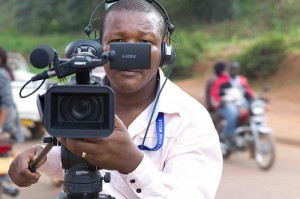 In short, the project aims to train journalists to produce interesting and professionally produced TV reports and documentaries – offering their audience an African perspective on a number of issues ranging from environmental protection, economic development and governance to poverty reduction, health and education.
In short, the project aims to train journalists to produce interesting and professionally produced TV reports and documentaries – offering their audience an African perspective on a number of issues ranging from environmental protection, economic development and governance to poverty reduction, health and education.
African Stories is also ambitious in scale involving broadcasters from across the continent. Television stations participating in the project send a production team to attend a two-week training course. The reports produced by each team during the training are in turn made available to all of the participating broadcasters.
To give you a better idea of the project, here are some stories produced during the recent workshop in Kampala in June.
![]() read more
read more
An inside look at Bhutan’s first TV program for kids
Thinley Yangchen Dorji, a producer at the Bhutan Broadcasting Service Corporation (BBS), takes us on a tour behind the scenes of Bhutan’s first homegrown TV show for kids. Called “My World”, it’s a 30-minute program for youngsters aged eight to twelve that began airing regularly in January. Welcome to “My World”!
Prior to “My World” there were no Bhutanese television programs for children. Foreign programming available via satellite was entertaining but had little educational value. Pema Choden, BBS’s General Director until the end of March 2011, approached DW-AKADEMIE for support. Her aim was to have a quality program tailored to children in Bhutan.
![]() read more
read more



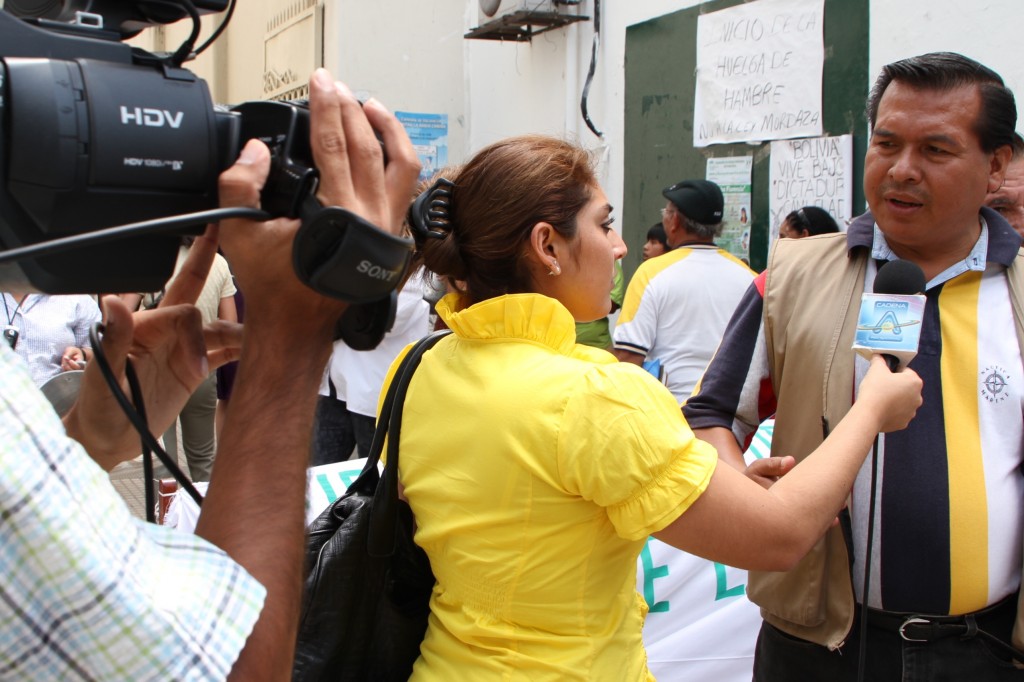






Feedback